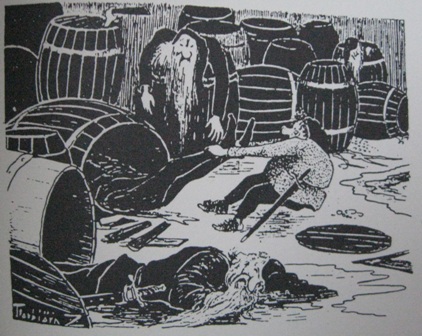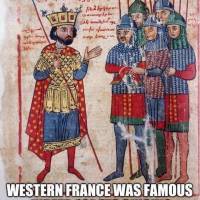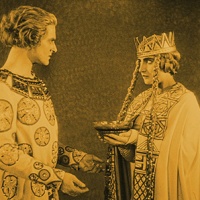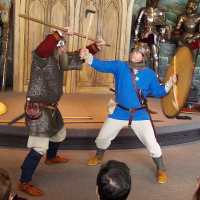J.R.R. Tolkien’s The Fall of Arthur was released last month. I had no idea Christopher Tolkien was even working on this project. It was a surprise because I thought Sigurd and Gudrun was the last we’d see of resurrected Tolkien poetry composed in the Alliterative style.

But I guess there’s plenty more in the vaults. The recent release of a Tolkien telling of Morte D’Arthur reminded me that I had yet to read the Middle English Stanzaic and Alliterative Arthurs – so I decided that now’s as good a time as any.
The first thing that struck me (besides lamenting that “breme as a bore”[1] – one of the Stanzaic Arthur poet’s favorite clichés – will never be a popular expression in my lifetime) was how Lancelot comes to wear the lady’s sleeve at the tournament in Winchester.
Lancelot announces that he will not attend Arthur’s tournament in Winchester because he’s feeling sick. Ever since Lancelot returned from the Quest for the Holy Grail, Agravain’s been trying to catch Lancelot in bed with Guinevere. Agravain, of course, thinks Lancelot is feigning sickness simply to stay behind and get physical with Guinevere. It turns out that Lancelot doesn’t hang around Castle Camelot as long as Agravain thought he would. Instead, our knight du lac travels by night and attends the tournament in disguise and fights so valiantly there that he almost dies in combat but that’s another story.
On the way to the tournament Lancelot stays with some guy who has armor he can borrow, allowing him to appear anonymously in the tournament. The guy has a daughter who complicates the situation of Lancelot’s love interest.
Now here’s where the French and the English versions differ. Lancelot’s interaction with the daughter is a little different in the Middle English Stanzaic than it appears in the French Vulgate cycle.[2] Here’s how the scene plays out in the French version:
That day Lancelot remained there and was served and provided with everything that nobleman could desire. The people in his lodging kept asking him who he was, but they were unable to find out anything. However, his squire spoke to the vavasour’s daughter, who was very beautiful and pressed him hard to reveal who his lord was; and when he saw her great beauty, he did not wish to refuse utterly, because that would have seemed an unmannerly thing to do, but said: “I cannot reveal everything to you, because I should probably incur my master’s anger, but I will certainly tell you all I can without harming myself. In fact he is the finest knight in the world…” (verse 13)[3]
Everyone, especially this girl, knows that that means, “Lancelot – that’s right – Lancelot is staying in your house!”
Then the girl went straight to Lancelot, knelt before him, and said:
“Noble knight, grant me a gift by the faith you owe to whatever you love most in the world.”
When Lancelot saw such a beautiful and charming girl on her knees before him, he was embarrassed and said:
“Please get up. Be sure there is nothing in the world within my power that I should not do in answer to your request, because you have asked me in such solemn terms.”
She got up and said, “My Lord, I thank you. Do you know what you have granted me? You have promised to wear my right sleeve on your helmet at the tournament instead of a plume, and to bear arms through love for me.”
When Lancelot heard this request he was annoyed; nevertheless he did not dare to refuse it because he had already promised. However, he was very regretful about having granted what she asked, because he realized that if the queen found out about it, she would be angry with him that, as far as he could see, he would never find his peace with her. (verse 14)[4]
Here’s how the scene appears in the Middle English Stanzaic Morte Arthur:
Th’erl had a doughter that was him dere;
Mikel Laucelot she beheld;
Her rode was red as blossom on brere
Or flowr that springeth in the feld;
Glad she was to sit him ner,
The noble knight under sheld;
Weeping was her moste cheer,
So mikel on him her herte gan helde. (Verses 177-84)[5]
The maiden with cheeks as red as a rose is so taken by Lancelot’s sight that she cannot look upon him without weeping. It of course incorporates soft and delicate flower imagery that penetrates with a painful prick like the point of cupid’s bow or a thorn on a rose or a… you get it.
He sat him down for the maiden’s sake
Upon her bedde there she lay
Courtaisly to her he spake
For to comfort that faire may.
In her armes she gan him take
And these words gan she say:
“Sir, but yif that ye it make,
Save my life no leche may.”(Verses 192-200)[6]
Reading this today summons images of girls screaming louder than the Beatles’ amplifiers in the 1960s or fans passing out at Michael Jackson concerts in the 1980s. One could almost imagine the wall of this maiden’s room covered with pictures of the Knights of the Round Table clipped from issues of Tiger beat magazine. There is little doubt that this maiden is as much a fan of Lancelot as these girls were of The Beatles.

Girls screaming at a Beatles performance in the Richard Lester film A Hard Day’s Night. Image copyright 1964 United Artists/MGM Holdings
Her blushing and swooning is a typical medieval description of love sickness. “Save my life no leche may” basically means that even a doctor cannot cure her of her love sickness. For its effect on men, see Chaucer’s Knight’s Tale when Arcite and Palamoun fall deeply in love with Emelye from simply seeing her gather flowers in the garden during the month of May from their prison window. Yes, it was that easy to get lovesickness in a Chaucer story. Arcite’s lovesickness caused by Emelye is so severe that it dramatically changes him when he is banished from Athens and forced to live with Perotheus in Thebes:
…lene he wex and drye as is a shaft;
His eyen holwe, and grisly to biholde,
His hewe fallow and pale as asshen colde,
And solitaire he was and evere alone,
And waillynge al the nyght, making his mone;
And if he herde song or instrument,
Thanne we wolde wepe, he myghte nat be stent.
So feble eek were his spiritz, and so lowe,
And chaunged so, that no man koude knowe
His speche nor his voys, though men it herde.
And in his geere for al the world he ferde,
Nat oonly lik the loveris maladye
Of Hereos, but rather lyk manye,
Engendered of humour malencolik,
Biforen, in his celle fantastik. (ll. 1362-76)[7]
Yes, he grew as thin and dry as a dried stalk. His face changed so much that no one he knew could recognize him anymore. He moaned and wailed all night and whenever he heard the sound of someone playing a musical instrument, he would cry so hard that no one could stop his tears. Chaucer ties his exaggerated description of lovesickness as it often appears in Heroic poetry together with some medical terminology suggesting that it could actually be a passage from a medical treatise. Everything can be said in the same breath by Chaucer…
Perhaps knowing she will suffer the same fate as Arcite for her love of a knight, the maiden in the Arthurian story asks Lancelot to at least display a token of her love when he fights in the tournament:
“Sithe I of thee ne may have more,
As thou art hardy knight and free,
In the tournament that thou wolde bere
Some sign of mine that men might see.”
“Lady, thy sleeve thou shalt of-shere;
I will it take for the love of thee;
So did I never no ladies ere,
But one that most hath loved me.”(Verses 201-08)[8]
The Stanzaic Arthur omits the scene with the maiden asking the squire Lancelot’s identity. Also, in the French version, the maiden specifically asks Lancelot to wear her sleeve, not just “some sign.”
In the French version, the maiden uses the manners of courtly love to her advantage by making Lancelot promise to grant her wish knowing that his code forbids him from rejecting her request – even if he doesn’t know what it is. This differs from the English version, where Lancelot offers to wear her sleeve.
The whole part about Lancelot’s annoyance with the matter and worrying about it complicating his relationship with Guinevere is omitted from the English version. It’s not a question of trimming down the length of the scene, because the English poet embellishes the scene in his own way to give a description of love sickness. Instead, deciding not to point out to the audience that Lancelot’s wearing the sleeve may create a problem with Guinevere, the English poet tells us something interesting about his audience. It suggests that the audience is well-versed in literature and intelligent enough to draw that conclusion on their own. It also allows for surprise which may mean that there was an audience growing tired of the storytelling styles that prevented the audience from experiencing surprises for themselves.
While it often serves the purpose of bringing a circular balance to their work, medieval poets are notorious for using foreshadowing to such an extent that the stories seems to contain no surprises for the audience whatsoever. The English version, at least in this scene, allows an engaged audience to formulate their own questions and see for themselves how the drama unfolds.
I prefer to have some of both. Medieval court audiences may have as well. There’s something to be said for the poet who holds the audience’s hand, giving clues, and sharing observations. The audience shares the experience with the poet – they are going on the journey together and seeing the same sights at the same time. It takes a tremendous amount of faith in the audience for the poet to allow them to draw their own conclusions about the drama and the meaning of the work. It may also suggest that the public recitation of poetry was meant to be interactive rather than just silently absorbed – or simply a new way for a dining court audience to enjoy a telling of an old poem.
[1] Fierce (or wild) as a boar. (O.E. valiant). Another cliché the poet uses every chance he gets is “withouten lees” – which passed the gulf to Modern English literally as, “Without lies.” It doesn’t have the same the ring to it, but it’s understood. What are some of the expressions storytellers use in place of “breme as bore” or “withouten lees” today?
[2] Mort du Roi Artu – the early 13th century French version. In this post I’m using the edition: The Death of King Arthur, Trans. James Cable, (London: Penguin, 1971).
[3] The Death of King Arthur, 29.
[4] The Death of King Arthur, 30.
[5] The Stanzaic Morte Arthur from King Arthur’s Death: The Middle English Stanzaic Morte Arthur and Alliterative Morte Arthure, ed. Larry D. Benson, (Indianapolis: Bobbs-Merril, 1974), 8.
[6] The Stanzaic Morte Arthur, 8.
[7] Chaucer’s Knight’s Tale in Middle English from Chaucer’s Major Poetry, Ed. Albert C. Baugh (New York, 1963), 264.
[8] The Stanzaic Morte Arthur, 9.
















